I love to read. By God’s grace I am a pretty fast reader; I usually read a couple books each week. I find it helpful to summarize my thoughts on each book and I offer those thoughts in the hope that you will be encouraged to either read or pass over the given title.
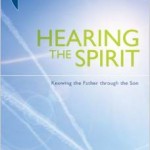 Hearing the Spirit: Knowing the Father through the Son by Christopher Ash. Good Mr. Ash is rapidly becoming one of my favorite contemporary authors. There is insightful interpretation, historical sensibility, cultural understanding, and wit to boot in all his work. Hearing the Spirit finds Ash employing all his skill to answer the age old question of, “How does God speak?” Or as he would prefer it, “What is the relationship between the Spirit and the Word?” Appropriately, most of the book expounds the relevant truth from John’s gospel on matters of the Trinity and the word of God. Ash’s answer to the question of the Spirit’s work can be traced as follows :
Hearing the Spirit: Knowing the Father through the Son by Christopher Ash. Good Mr. Ash is rapidly becoming one of my favorite contemporary authors. There is insightful interpretation, historical sensibility, cultural understanding, and wit to boot in all his work. Hearing the Spirit finds Ash employing all his skill to answer the age old question of, “How does God speak?” Or as he would prefer it, “What is the relationship between the Spirit and the Word?” Appropriately, most of the book expounds the relevant truth from John’s gospel on matters of the Trinity and the word of God. Ash’s answer to the question of the Spirit’s work can be traced as follows :
- Jesus is the awesome revelation of the Father and He revealed the Father through words. (chapter 1)
- In a very real sense the ministry of Jesus’ was a failure – for a time. He made the Father known and yet nobody saw the Father. Until the cross, when sin was paid for, the Spirit could not be poured out and the Father known through the words of Jesus. (chapter 2)
- In the Bible’s words we have the authentic, faithful, and complete testimony of Jesus and His words, and therefore we have the revelation of the Father. The father is made known by Jesus, and Jesus is attested by the Bible. (chapters 3-4)
- The Bible is a complete testimony to Christ and therefore has an intelligible and stable meaning. (chapter 5)
- The objective, historical testimony of Jesus and the subjective testimony to Jesus of the Spirit are complementary and inseparable. (chapter 6)
- The Spirit’s ministry today is to graciously bring conviction that the objective testimony is true. (chapter 7)
Along the way Ash offers great clarity on mystical approaches to Christianity, the source of powerful preaching, the nature of living by faith, not by sight, and why Christians have a divine obligation to be skeptical (let the reader understand). An excellent and timely work!
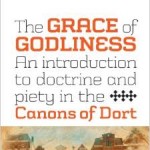 The Grace of Godliness: An Introduction to Doctrine and Piety in the Canons of Dort by Matthew Barrett. Barrett says, “While the number of volumes on John Calvin, the Heidelberg Catechism or the Westminster Confession, are legion, the same cannot be said concerning the Canons of Dort. . . . As far as I know, no book exists in English on Dort’s emphasis on piety. And yet, the topic of piety and godliness is one that saturates the canon.” Oh how right Dr. Barrett is. The Canons of Dort are not only, for my mind, as good as any other historic creed or confession at clearly delineating the gospel, they also represent a watermark of Reformed piety. If you can get a right understanding of God’s sovereign gospel then you will be well on your way toward holiness, humility, assurance, and reverent worship. The Canons of Dort will aid such godliness and Barrett’s book is a perfect introduction that classic document of Reformed faith and practice.
The Grace of Godliness: An Introduction to Doctrine and Piety in the Canons of Dort by Matthew Barrett. Barrett says, “While the number of volumes on John Calvin, the Heidelberg Catechism or the Westminster Confession, are legion, the same cannot be said concerning the Canons of Dort. . . . As far as I know, no book exists in English on Dort’s emphasis on piety. And yet, the topic of piety and godliness is one that saturates the canon.” Oh how right Dr. Barrett is. The Canons of Dort are not only, for my mind, as good as any other historic creed or confession at clearly delineating the gospel, they also represent a watermark of Reformed piety. If you can get a right understanding of God’s sovereign gospel then you will be well on your way toward holiness, humility, assurance, and reverent worship. The Canons of Dort will aid such godliness and Barrett’s book is a perfect introduction that classic document of Reformed faith and practice.
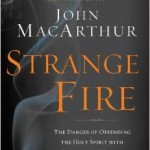 Strange Fire: The Danger of Offending the Holy Spirit with Counterfeit Worship by John MacArthur. As I watched last October’s Strange Fire Conference create no small amount of evangelical hullabaloo, I knew I’d eventually have to read the book. Well, this week I finally did. And I thoroughly enjoyed it. For several decades MacArthur has been the most visible, and popular, opponent of Charismatic and Pentecostal excess. The uniqueness of Strange Fire, and I suspect the reason it struck such a chord, is that it has firm clarity directed at the growing continuationist crowd. MacArthur’s exegesis of the relevant texts is typically lucid and confident, and his grasp of the historical flow of charismatic theology is compelling and strong. No matter where you fall on the continuum of spiritual gifts, this book would be well worth your time.
Strange Fire: The Danger of Offending the Holy Spirit with Counterfeit Worship by John MacArthur. As I watched last October’s Strange Fire Conference create no small amount of evangelical hullabaloo, I knew I’d eventually have to read the book. Well, this week I finally did. And I thoroughly enjoyed it. For several decades MacArthur has been the most visible, and popular, opponent of Charismatic and Pentecostal excess. The uniqueness of Strange Fire, and I suspect the reason it struck such a chord, is that it has firm clarity directed at the growing continuationist crowd. MacArthur’s exegesis of the relevant texts is typically lucid and confident, and his grasp of the historical flow of charismatic theology is compelling and strong. No matter where you fall on the continuum of spiritual gifts, this book would be well worth your time.
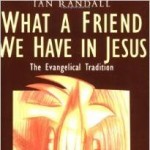 What a Friend We Have in Jesus: Spirituality in the Evangelical Tradition by Ian Randall. Alistair McGrath once called evangelicalism “the slumbering giant in the world of spirituality.” In What a Friend We Have in Jesus Ian Randall, Director of Research at Spurgeon’s College in London, sets out to document what evangelical spirituality is and how it came about. Spanning the time between the Great Awakening and the closing of the 20th century Randall effectively shows the unity and diversity found in evangelicalism’s emphasis on the cross, conversion, personal sanctification, and world missions. The work is an overview so Randall has to assume some level of knowledge with people and places, but I found the work informative, clear, and full of interesting tidbits about evangelicalism’s spiritual practice.
What a Friend We Have in Jesus: Spirituality in the Evangelical Tradition by Ian Randall. Alistair McGrath once called evangelicalism “the slumbering giant in the world of spirituality.” In What a Friend We Have in Jesus Ian Randall, Director of Research at Spurgeon’s College in London, sets out to document what evangelical spirituality is and how it came about. Spanning the time between the Great Awakening and the closing of the 20th century Randall effectively shows the unity and diversity found in evangelicalism’s emphasis on the cross, conversion, personal sanctification, and world missions. The work is an overview so Randall has to assume some level of knowledge with people and places, but I found the work informative, clear, and full of interesting tidbits about evangelicalism’s spiritual practice.
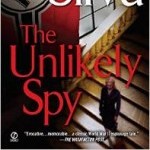 The Unlikely Spy by Daniel Silva. Before he was a best-selling thriller writer and the mastermind behind the widely successful Gabriel Allon thriller novels, Daniel Silva was a television producer at CNN. While overseeing shows like Crossfire and Capital Gang, Silva was quietly penning a debut novel that would be such a resounding hit the budding author would pursue writing full-time. The Unlikely Spy was that debut novel. This thriller is set in the throws and intrigue of the Double-Cross system which was enshrouded the truth of the Allies’ D-Day landing in, as Churchill famously said, “a bodyguard of lies.” Although the book doesn’t shine any new light on MI6, the Abwher, or war-time deception, the plot moves quickly and characters are believably developed. A fun read that, at times, seems strikingly similar to Follet’s Eye of the Needle.
The Unlikely Spy by Daniel Silva. Before he was a best-selling thriller writer and the mastermind behind the widely successful Gabriel Allon thriller novels, Daniel Silva was a television producer at CNN. While overseeing shows like Crossfire and Capital Gang, Silva was quietly penning a debut novel that would be such a resounding hit the budding author would pursue writing full-time. The Unlikely Spy was that debut novel. This thriller is set in the throws and intrigue of the Double-Cross system which was enshrouded the truth of the Allies’ D-Day landing in, as Churchill famously said, “a bodyguard of lies.” Although the book doesn’t shine any new light on MI6, the Abwher, or war-time deception, the plot moves quickly and characters are believably developed. A fun read that, at times, seems strikingly similar to Follet’s Eye of the Needle.
Click here to find other entries in the Recent Reads series.
